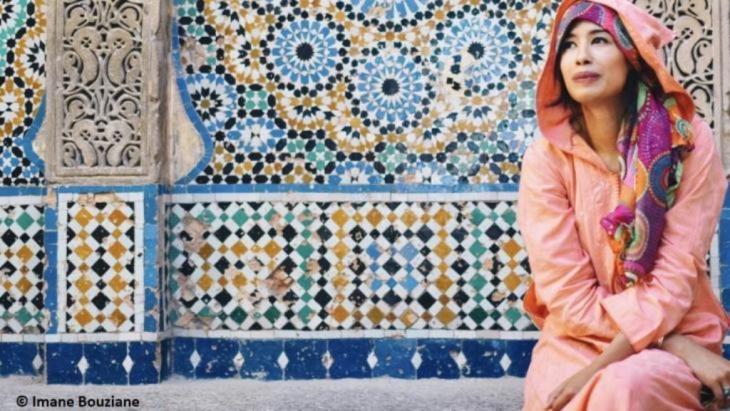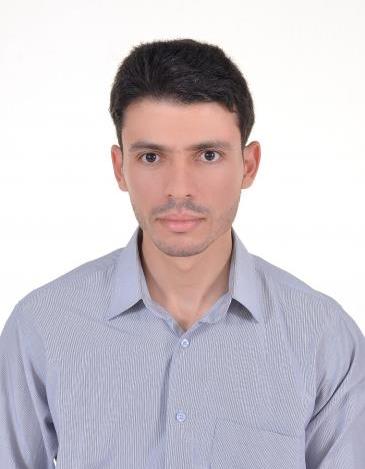Published by Facebook

As the trend in social media took off, there was a fear that it would drive young Moroccans further away from writing, against a background of dismal statistics showing that most people in North Africa and the Middle East read only a few pages a year. This fear found its echo in the invasion of smartphones into everyday life, in such a manner that left books as no more than decoration in the front rooms of many households.
Despite this gloomy outlook, many Moroccans actually use social media to find out about books. Visit social media sites and you will see Facebook groups such as "Publications Iʹve read", "Ktoubna" and "Book share". These groups attract tens of thousands of eager readers. Moreover, Moroccan readers get involved in the group discussions on individual books via the Goodreads platform to review the writings.
This interest does not stop at reading books; it extends to writing them as well. These days it is apparent that many young Moroccan writers set out to write novels early in their lives, even though some of them are only known for their literary aptitude through Facebook.
Amongst those writers with whom Moroccan readers have become acquainted via social media is Abdul Aziz al-ʹAbdi who recently published "The book of faces" (a literal translation of Facebook). There is also Abdul-Samiʹ Bensaber, who recently published the novel "A Serpentʹs tail", as well as Mohammed Benmiloud who wrote "The Dangerous Neighbourhood", as well as many others who have either just begun or recently circulated their literary works on social media.
In this article, we will look at some of these writers, although the choice of the names below is not a reflection of their literary merit or lack of it. Rather, they are examples which shed light on the phenomenon of writing amongst young Moroccans.
Abdelmajid Sbata

A few weeks ago, Sbata won a Moroccan literary award for his second novel "Zero Hour". Speaking to Qantara, he explains that his literary writing began before the emergence of digital platforms, but he quickly adds that the Internet has put him in "direct contact" with readers, both those who review his works and others who give him feedback.
He also alludes to the fact that more effort is needed to "achieve readersʹ dreams, or at least, to produce a generation that is creative and able to continue the Moroccan literary narrative." Hasnʹt Sbata benefitted from social mediaʹs promotion of his last work?
He responds that the Internet has indeed helped to introduce readers to his novel, but he adds that this alone is not enough:
"Depending on the number of virtual followers alone is a grave mistake, the repercussions of which have been apparent more than once. At the end of the day, only good writing stands the test of time. Good work retains its value over time. As for shoddy work, people soon forget it, even if the author has thousands of followers."
Fatima al-Zahraaʹ Al-Riyadh
Al-Riyadh has authored several literary works, and she recently published "A man with a difference – one who does not say me, me, me." In conversation with Qantara, Al-Riyadh reiterates that Facebook, having started out as a place to contact old school friends, has become the most appropriate place for writing private memoires.
She admits that at first she used to find blogs quick and easy to write, but in time Facebook became a virtual cultural centre: "I started going to Facebook to write a poem or a thought, and to learn of my followersʹ views at the same time. This helped me to move from being an unknown writer to a storyteller-come-novelist."
Al-Riyadh points out that the current generation is seeing rapid change, combined with "abundant pain and perplexity". For that reason, "perhaps we live in a time when we need to write about our own viewpoints and aspirations; writing that speaks for a generation and reflects what is going on around it." She emphasises that the novel today, despite the "lack of interest from critics, being ignored by leading writers and ridiculed by others, has become a voice to be reckoned with. These novels earn big rewards and dominate the market for bestsellers."
Tareq Bakari
Bakari became famous after his novel "Numedia" was short-listed for the Arabic Booker Prize. More recently, he published "The Blonde Killer". Bakari explains that he developed an early interest in novel writing, adding that reading is what enriches talent. Itʹs what lends the writer experience beyond his years. Bakari adds: "Being in the company of my characters taught me that a short life with major experiences is richer than a long life without experience. Experience doesnʹt depend on our age in years, but on the quality of our lives."
Bakari doesnʹt think that social media negatively affects reading. Indeed, in some websites thereʹs an "audience eager to read and one which is growing at a reassuringly steady pace". Furthermore, "inside every avid reader thereʹs a will to become a writer. Hence a good number of young people are now turning to writing and are knocking on publishersʹ doors."
Social media sites have another positive aspect, in Bakariʹs view: "they have placed writers and readers in a direct and spontaneous embrace, helping to create points of contact between the two sides. They have also pushed aside other media outlets which used to monopolise the publishing industry."

The pros and cons of "democratised" publishing
According to Moroccan cultural critic Abdul-Razak al-Mesbahi, social media has "democratised" publishing. It has "opened the door to many a young person to publish his or her creative writings, which would otherwise not have found an opportunity through the traditional publishing channels."
Moroccan media guru in cultural affairs Yassin Adnan agrees that social media sites have brought many positives for literature and for writers: "theyʹve created a space for communication with readers, so it has become possible to promote literature every day. In addition, the significant space which Facebook provides encourages one to write. The lively nature of Facebook helps to democratise writing in a wonderful way."
This notwithstanding, there are plenty of negatives. The quantity of written works published and promoted via social media has led many to think that it is easy to get into writing without the skill set which might usually be required.
As Adnan says, "instant ʹLikesʹ have become an immediate reference point, which can make some think that they donʹt need proper critical analysis of their work. Sometimes, this leads to confusion, if the script is imprecise."
In this regard, Al-Riyadh has a bleak view of the present relationship between Facebook and literature, not to mention those who, she says, have jumped on the bandwagon. In Al-Riyadhʹs view, Facebook "only encourages photographs, fake news and swearword-infested blogs. Meanwhile, real writers of poetry, fiction and ideas are left standing on the sidelines."
Al-Mesbahi agrees about the negative points of social media on literature: "some of those who perceive the vacuum created by the lack of criticism of each and everything posted on social media have used this to manufacture fake names fuelled by marketing." The critic explains that many Moroccan writers have not invested in the social, cultural and political output of social media, which could have otherwise provided a rich seam of creative material.
Despite these negatives, there is a big push to publish amongst young Moroccans. This is a healthy development, provided that the current generation is protected from the "chaos of writing, or the spectacle of the writer who has never written a book in his life, which is what some other countries are suffering from," interjects Sbata.
Al-Mesbahi provides another explanation: "thereʹs a dynamism which is created first and foremost by the awards, but this does not negate the artistic value of many of the novels written by young Moroccan writers. Reliance on the limelight from the award and on promotional activity does not make for a good novelist. Thatʹs why we havenʹt seen a young novelist produce a creative project that commands a large readership after the bang created by an award."
At the end of the day, it is up to young Moroccan novelists to set up their own projects and not just blindly follow the artistic trends that typecast the work of those who hanker after awards.
Ismail Azzam
© Qantara.de 2019
Translated from the Arabic by Chris Somes-Charlton
